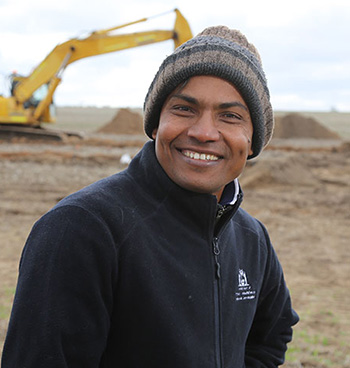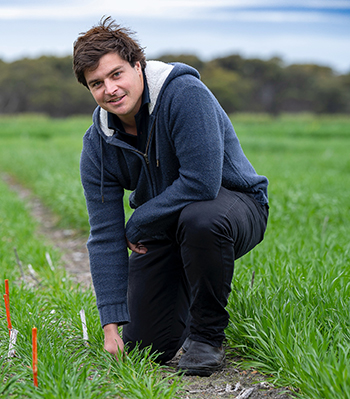Two Western Australian grains researchers have been recognised for their contributions to the extension of research outcomes, receiving awards at the GRDC Grains Research Update – Perth today (February 28).
WA Department of Primary Industries and Regional Development (DPIRD) soil scientist Gaus Azam received the GRDC Recognising and Rewarding Excellence award for the western region.
Esperance based research scientist Jeremy Curry, also from DPIRD, was presented with the Emerging Leader award.
GRDC western panel chair Darrin Lee says the annual awards celebrated the grains sector's most committed researchers and innovators.
"Gaus and Jeremy's research and extension work is of an extremely high calibre," Mr Lee says.
"They have made an outstanding industry contribution, not just from a research perspective, but in ensuring information is communicated effectively to growers and then applied on-farm.
"GRDC works closely with DPIRD as a primary research partner in WA, and it is fitting that we recognise two of its dedicated researchers today with these prestigious awards."
 DPIRD soil scientist Gaus Azam received the GRDC Rewarding and Recognising Excellence award for the western region. Photo: GRDC/Anvil Media
DPIRD soil scientist Gaus Azam received the GRDC Rewarding and Recognising Excellence award for the western region. Photo: GRDC/Anvil Media
A soil scientist with more than 15 years' experience in Australia and overseas, Dr Azam is the lead researcher on a $22 million GRDC and DPIRD project to define grain yield potential in the absence of soil constraints, with a view to developing the most profitable and long-lasting strategies.
The project focuses on 12 million hectares of arable land covering diverse soil types in the low to high-rainfall areas of WA, where subsoil compaction, subsoil acidity, sodicity and water repellence regularly occur in combination. Outcomes from the project will have impact across Australia.
"Gaus was selected by the GRDC western panel to receive this award in recognition of his dedication to delivering soil constraints research and extension that results in meaningful improvements for grain growers," Mr Lee says.
"Gaus is an innovator and he thinks outside the box, which is exactly what GRDC is looking for. The quality of his delivery in extending his research findings is outstanding; he really captures the attention of audiences through his approach.
"I am genuinely excited about where his work in reengineering soils and closing yield gaps will lead, and how growers will adopt these findings. The results are astonishing; it's a new frontier in soils research."
Dr Azam says that his passion for working closely with growers stemmed from his upbringing on his own family farm in Bangladesh, and now as a researcher in Australia, he had an opportunity to positively contribute to grain productivity to increase global food security.
"Through soil re-engineering work to date, we've proved that we can achieve even more productivity than the yield gaps suggest," Dr Azam says.
"If a grower in the United Kingdom can grow a 16-tonne wheat crop, then we shouldn't be happy with a one-to two-tonne wheat crop here in WA.
"There are a lot of gains, a lot of productivity improvements still to come. We're lucky to have this big country and the opportunity to feed the world."
 Esperance-based research scientist Jeremy Curry was presented with the GRDC western region Emerging Leader award. Photo: Evan Collis/GRDC
Esperance-based research scientist Jeremy Curry was presented with the GRDC western region Emerging Leader award. Photo: Evan Collis/GRDC
Esperance-based research scientist Jeremy Curry was presented with the Emerging Leader award, recognising commitment, passion and leadership potential demonstrated by an individual in the Australian grains industry.
Mr Curry joined DPIRD in 2015 and has since worked across several agronomy projects focusing on improving the yield and quality of wheat, barley and canola in WA.
Mr Curry says he was honoured to be recognised with a GRDC award and described working with growers and other researchers as some of the most enjoyable aspects of his work.
"Working with growers is key because you can really see the application of the research," Mr Curry says.
"The high rainfall zone project I'm working on is about pushing new yield and profit boundaries. We're looking at what the leading growers are doing, and how we can extend that further."
Mr Lee says that as a relative newcomer to the grains industry, Mr Curry had demonstrated rapid growth and development, and had built strong relationships with growers and researchers.
"I have seen Jeremy present at updates and field days on many occasions and have witnessed firsthand the confidence he brings to the delivery of research outcomes," Mr Lee says.
"At a field day in Esperance last year it was absolutely bucketing with rain while Jeremy presented, and yet not one participant walked away to find shelter, as they we so enraptured by his presentation.
"Jeremy is among a cohort of young DPIRD researchers who are emerging as potential future leaders in the grains research space. They invigorate the industry - we need these kinds of people in agriculture."
The GRDC Grains Research Update – Perth concludes today (28 February) with the regional Updates series beginning in Bencubbin on Thursday 2 March.






